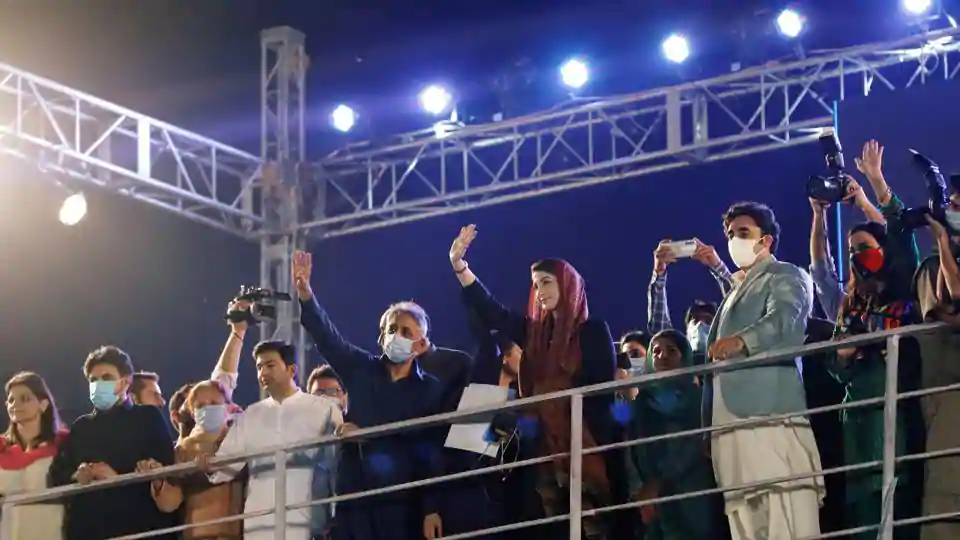
SOURCE: HT
Pakistan is at another of the inflection points that seem to crop up in the nation’s path every few years largely because of the imbalance in relations between the military and the civilian government. This time, the trigger is a movement launched by opposition parties with the stated aim of removing what they describe as the “selected” government of Prime Minister (PM) Imran Khan.
Former premier Nawaz Sharif’s Pakistan Muslim League-N (PML-N) and the Pakistan People’s Party (PPP) have created the Pakistan Democratic Movement (PDM) and organised a series of “jalsas” or rallies in major cities.
Latent tensions between Sharif and the military establishment exploded into the open when the PML-N leader named army chief Gen Qamar Bajwa and Inter-Services Intelligence (ISI) chief Lt Gen Faiz Hameed during PDM’s first massive rally at Gujranwala on October 16, blaming them for ousting his government, pressuring judges to take up fake cases against opposition leaders, and making Khan the PM through a rigged election two years ago.
Sharif, who has lived in London for almost the past year and addresses gatherings in Pakistan via video conference, kept away from PDM’s second rally in Karachi on October 18, which too attracted a huge crowd. But the incensed military retaliated by pressuring police in the port city to arrest Sharif’s son-in-law Muhammad Safdar Awan the following day. After more than 50 police officers in Sindh, of which Karachi is the capital, went on leave to protest the way the provincial police chief was harassed by military intelligence agencies to order Awan’s arrest, Bajwa ordered an inquiry and spoke to Bilawal Bhutto Zardari, whose PPP rules Sindh, to calm the situation.
There is already speculation in Islamabad that Sharif acted after getting signals from sections of the military upset with Bajwa — a grant of extension in service to Pakistan army chiefs, such as the one given to Bajwa last year, is usually followed by a decline in popularity — as well as Saudi Arabia and the United Arab Emirates, key background players in Pakistan’s politics with considerable sway over political alignments. This is understandable as there is little love lost between the current PM and the Saudis. There is even buzz that Sharif received discreet messages from China, which has warily watched Pakistan’s economic decline on Khan’s watch, especially in view of its immense stake in the China-Pakistan Economic Corridor.
Perhaps, a simpler explanation is that the PDM has in its fold two of Pakistan’s most astute and street-smart leaders — Sharif and Jamiat Ulema-e-Islam-Fazal chief Maulana Fazlur Rehman, who has long harboured outsized dreams of being PM. Both have their finger on the pulse of the streets and are capable of gathering large crowds. They know that public sentiment for the Khan government is at a low, with the price of wheat touching a record high, government employees protesting over salaries, galloping inflation and near-complete lack of support from the International Monetary Fund and the Saudis. Sharif and Rehman, more than anyone else, know the time is right to make efforts for a change.
For Sharif, there is also the need to remain politically relevant, after having been ignominiously removed as premier by the Supreme Court on flimsy charges of corruption and then jailed. He left the country on bail on medical grounds, and Khan, stung by the PDM’s shows of strength, has vowed to bring him back to Pakistan. Sharif’s current efforts, in a situation where he knows he has little left to lose, are also aimed at preparing the grounds for his anointed successor, daughter Maryam Nawaz Sharif.
The Indian establishment, which has done well to keep away from political developments in Pakistan, must also distance itself from misinformation campaigns which don’t capture the complexity of the situation — no good has ever come of such moves in this digital age. One will have to wait for PDM’s moves to see whether the military jettisons those who are no longer useful to it or responds with more crackdowns.






